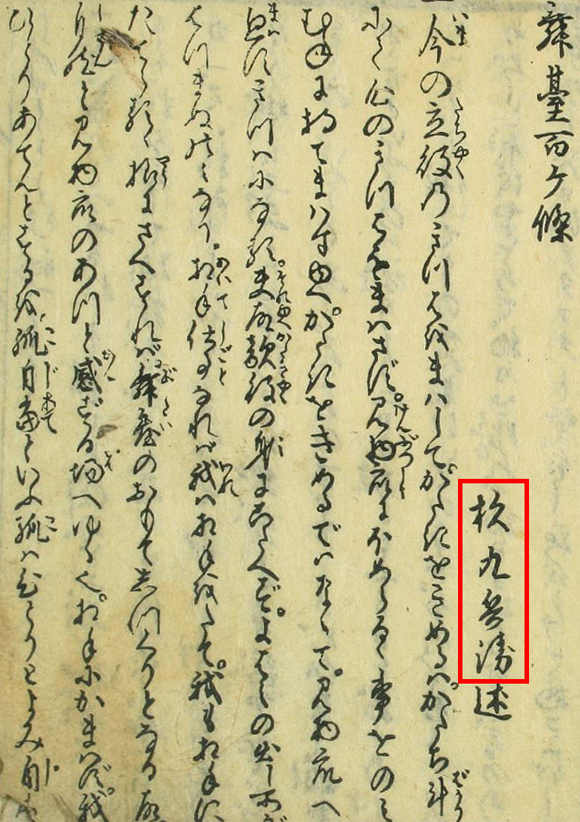| SUGI KUHÊ |
|
Stage name:
Existence: ??? ~ ??? Connection: Mentee: Sakata Tôjûrô I Career: 1670 ~ 1680: absolutely no stage record but it was said that he was an important kashagata actor performing in Kyôto. Comments: Sugi Kuhê was an important actor with a strong influence on Genroku Kabuki because he acted as advisor to the star Sakata Tôjûrô I. He was the first kashagata in Kyôto but little is known about him. He was the author of the book "Butai Hyakkajô" ('One Hundred Items on Stage'), included in the early 18th century book "Yakusha Rongo" ('The Actors' Analects'). "One Hundred Items on Stage" by Sugi Kuhê, consists, in fact, not of one hundred, but of seven items discussed by the author.
These include his concern over declining standards, his advice for actors preparing for a role, and descriptions of the general types of roles.
Sugi was an advisor to Sakata Tôjûrô I, one of the most influential actors of the time.
Sugi advises actors to put their full energy into rehearsal, so that the role will flow naturally from them in performance.
He also discusses a subject that arises later in the Analects: the balance between acting for the audience and acting for the role.
In other words, should the actor focus on portraying the play as reality, acting as if it were real,
or should the actor consider what appears favorable from the audience's perspective? Sugi's chief example of this dilemma
is illustrated through a sword fight: should the actor wield the sword towards their fellow actor with movements,
attitude, and body language indicative of genuine readiness for combat, or should they execute a set of stage movements solely intended to
represent the fight for the audience? In this section, another related element discussed is the balance between fiction and reality onstage.
Unlike Western theatre, Kabuki does not aim to represent reality photographically; instead, it seeks to create a fantastic,
larger-than-life world rooted in reality. Sugi's paradoxical statement, "the realism of a play springs from fiction;
if a comic play is not based on real life, it is unnatural," encapsulates this concept. Aside from focusing solely on acting and roles themselves,
this section and others also deal with the attitudes and behavior of actors in general, in regards to the audience and to their fellow actors.
They advise against upstaging other actors and turning the drama into a competition; they also advise against not giving one's all
due to the presence of a smaller audience. However, the Analects also caution against the opposite. Actors should not allow themselves
to be entirely subsumed in an ensemble, and must strive to make a name for themselves. They must also seek to adapt every performance
to the audience. This ties into another key difference between kabuki and Western theatre; kabuki never seeks to reproduce
a performance exactly as it is written nor exactly as it was performed in the past. Every performance is a new creative endeavor. There was an assumption in the Kabuki circles that Sugi Kuhê and the sakusha Sugi San'an, who was active during the Enpô era, could have been the same person. "There was a famous kashagata named Sugi Kuhê. Tôjûrô, when he had turned twenty, went to Kuhê and told him he wanted to study how to act. Kuhê replied, " Since I am a kashagata, I have done much imitating of women. You are a tachiyaku, so you must imitate men. When one considers present-day tachiyaku actors, there do not seem to be many men among them. Nevertheless they are not onnagata and there is no reason at all for their lack of masculinity. You go and study how to imitate men!" Tôjûrô said that he followed this advice and learned something of the actor's art. Shortly after the above conversation took place, Kuhê was praised as a master actor unlikely to be equalled in the Three Cities. ." (from Kaneko Ikkô's book "Nijinshû" ("Dust in the Ears") in "The Actors' Analects" by Charles J. Dunn and Torigoe Bunzô) |
 |
|
The name of Sugi Kuhê as writer of the book "Butai Hyakkajô" ('One Hundred Items on Stage'), included in "Yakusha Rongo" ('The Actors' Analects') |
|
|
| Contact | Main | Top | Updates | Actors | Plays | Playwrights | Programs | Links | FAQ | Glossary | Chronology | Illustrations | Prints | Characters | Derivatives | Theaters | Coming soon | News |